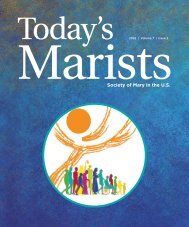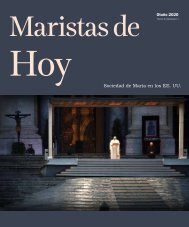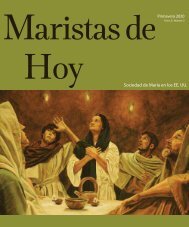Today's Marists 2024 Volume 8, Issue 2
You also want an ePaper? Increase the reach of your titles
YUMPU automatically turns print PDFs into web optimized ePapers that Google loves.
Forgiveness, Reconciliation, and Restoration:<br />
Instruments of Divine Mercy<br />
by Bill Rowland, SM, Rector, Marist School, Atlanta, Georgia<br />
It seems the second most frequently asked<br />
question of priests, with the first one being<br />
how to pray, is how to forgive. Let us look<br />
at that question and its relationship with<br />
reconciliation and restoration. I will give<br />
you this teaser and say that forgiveness is<br />
different from reconciliation or restoration.<br />
I borrowed heavily from Fr. Mike Schmitz,<br />
a popular author, speaker, podcaster and<br />
Director of Youth and Young Adult Ministries<br />
in the Diocese of Duluth, MN, whose<br />
podcast, Forgiveness Is Not the Same as<br />
Reconciliation, is the basis for what follows.<br />
To begin, forgiveness is not saying everything<br />
is fine or saying not to worry about it or to<br />
move on. When people ask how to forgive,<br />
they are asking what to do with feeling hurt,<br />
angry and resentful. Forgiveness is not<br />
a magic wand that quiets those feelings,<br />
which are like a violent storm that upsets our<br />
emotional equilibrium, causes havoc to our<br />
mental stability, impairs our physical wellbeing<br />
and affects us spiritually. Imitating<br />
Christ on the cross who said, “Father, forgive<br />
them for they know not what they do,” (Lk.<br />
23:34) seems beyond our capability and even<br />
willingness to do. Now we have additional<br />
feelings of guilt and inadequacy with which<br />
to deal.<br />
When we have hurt someone or have been<br />
hurt ourselves, we protest the injustice of it<br />
all. Something has been taken from us, such<br />
as friendship, trust, reputation and overall<br />
well-being. We want those back. Now, we<br />
have entered into the realm of justice. The<br />
virtue of justice requires that we get back<br />
what has been taken from us or give what<br />
someone is owed.<br />
The first step to forgiveness is acknowledging<br />
that the person who hurt us owes us<br />
something. The second step will require<br />
some time to identify how someone has<br />
hurt us and how that person is indebted<br />
to us. This will lead to the third step, the<br />
decision to cancel the debt. We are telling<br />
the person who offended us that we will not<br />
make them pay us back. It is not the same<br />
as saying it is okay when our feelings tell us<br />
differently. It acknowledges that pain but<br />
consciously cancels the debt someone owes<br />
us. It means not waiting for the other person<br />
to pay us back in full. That may not even be<br />
possible. This does not happen overnight. It<br />
is a process and we have to make that choice<br />
repeatedly.<br />
It also may mean letting go of the hurt<br />
and even the person who has caused us<br />
so much pain. It means letting go of this<br />
person, friendship or the depth we once<br />
shared because they cannot be trusted. That<br />
brings us to what I said at the beginning,<br />
forgiveness is not the same as reconciliation.<br />
Reconciliation has to do with repairing the<br />
relationship. It takes time to rebuild the trust<br />
that has been broken. Fr. Schmitz makes the<br />
following analogy. We may lend someone<br />
our car to use, and they may get into an<br />
accident. If this involves a son or daughter,<br />
parents may release them from paying the<br />
cost to repair the car, which they owe in<br />
justice. They are canceling the debt, and that<br />
is forgiveness.<br />
That does not mean their son or daughter<br />
can drive the car immediately. Parents may<br />
place restrictions that have to be met, such as<br />
when, with whom, where and how often the<br />
car can be driven. Trust has to be restored<br />
to repair the relationship. That is the work of<br />
reconciliation, and that too, is a process.<br />
That leads to the third step, restoration. Now<br />
the relationship is back on track and maybe<br />
even stronger than before the event that<br />
caused the rupture.<br />
The grace of forgiveness, reconciliation<br />
and restoration played essential roles in<br />
healing South Africa and Rwanda. Nelson<br />
Mandela, South African anti-apartheid<br />
activist and South Africa’s first president<br />
from 1994 – 1999, initiated a national process<br />
of forgiveness, restoration and reconciliation<br />
toward his former captors as he tried to steer<br />
his nation away from resorting to violence<br />
and retribution.<br />
Left to Tell, a book written by Immaculee<br />
Iligagiza, describes the horrors of the<br />
Rwandan Holocaust, including her family<br />
being brutally murdered and costing the<br />
lives of nearly a million Rwandans. Her trust<br />
in God’s love for her enabled her to seek out<br />
and forgive those responsible for killing her<br />
family.<br />
<strong>Marists</strong> are to be instruments of Divine<br />
Mercy. Forgiveness, reconciliation and<br />
restoration are acts of Divine Mercy that are<br />
to be brought to bear in various settings and<br />
relationships including families, friendships,<br />
business, politics and international relations.<br />
To be conduits of Divine Mercy, we must<br />
acknowledge our need for and be recipients<br />
of this grace.<br />
We can experience this grace in the<br />
Sacrament of Penance, also called the<br />
Sacrament of Reconciliation. There, we are<br />
forgiven immediately. We are reconciled<br />
to God immediately. Our relationship<br />
with God is restored immediately. So,<br />
if you struggle with forgiving someone,<br />
reconciling with someone and restoring a<br />
broken relationship, frequent the Sacrament<br />
of Reconciliation. Then return to your<br />
family, work or school and carry-on being<br />
instruments of Divine Mercy by being<br />
instruments of forgiveness, reconciliation<br />
and restoration.<br />
8 Today’s <strong>Marists</strong> Magazine















